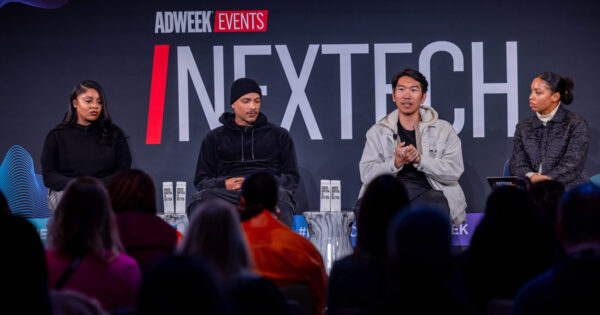
With artificial intelligence making swift advancements every day, the metaverse—recently presumed “dead” in the industry—is silently enabling brands to bridge physical products with digital experiences, reaching new audiences and ultimately driving revenue.
During Adweek’s NexTech event on Nov. 15, Puma shared how its bullish Web3 initiatives dispelled common crypto critiques. Thanks to its blockchain-driven campaign earlier this year with entertainment agency Roc Nation and phygital products platform Legitimate, the apparel giant sold more than 16,000 pairs of shoes online and in stores. In celebration of its 50th anniversary, Puma paid tribute to hip-hop by joining forces with Roc Nation—founded by rapper Jay-Z—and designer Alexander-John. As a result, the brand launched a sneaker collection tied to blockchain technology and dedicated to the evolution of mixtapes.
Puma’s campaign introduced three distinct shoe versions inspired by various mixtape formats, including cassettes, CDs and playlists. Each pair featured an LTG tag, embedding unreleased music from Roc Nation, coupled with exclusive video content from the artists themselves.
“When you look at Gen Z and younger generations, they are growing up with [technology] around them,” said David Ballin, senior brand strategist, Puma. “It’s incumbent of us, in the sneaker industry, to find new ways to attract and engage consumers so that we can stay ahead.”
Brands’ Web3 initiatives were hindered by economic uncertainty and crypto infamy, leading to a slower adoption among people. However, with sneakerheads’ inherent penchant for collecting, it comes as no surprise that shoe brands are among the pioneers of the Web3 realm, recognizing the revenue-generating possibilities—especially through NFTs and blockchains. For Puma, its efforts lie in tying cultural moments and meeting tech-savvy audiences where they are, underscoring the importance of retaining brand authenticity.
Puma’s campaign saw a 90% opt-in from people through marketing communication and a 65% marketing communication open rate, which is three times the industry standard, according to Calvin Chan, CEO and founder, Legitimate. To that, the average engagement duration recorded was a little more than 3 minutes and reached consumers in 20 different countries, despite the campaign’s initial focus on the U.S. market.
Most consumers don’t care about buzzwords such as blockchains. They care about products and brands, making [brand] authenticity important, said Chan.
https://www.adweek.com/programmatic/pumas-web3-efforts-driving-consumer-engagement/

